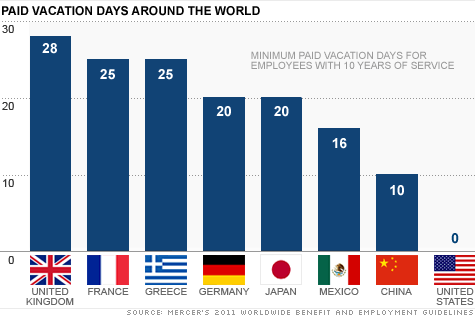The Importance of Leisure
The United States Is Called the “No Vacation Nation”.
Are Americans allergic to leisure time? 57% left unused vacation on the table. Reasons given:
- Too much work to do
- Afraid of being replaced
- Don’t want to come back to huge pile of work
- Can’t afford to do anything out of the ordinary
- No backup at work

Chart retrieved from CNN/Money
In recognition of National Mental Health month, we offer this article from The Wellness Lifestyle Workbook on the importance of leisure followed by an exercises for “Leisure Exploration” and “Overcoming Barriers to Leisure Participation.” We invite you to use the article and the worksheets for yourself and for your clients.
The Importance of Leisure
By Ester R.A. Leutenberg and John J. Liptak, EdD.
Leisure can be defined as a period of time that we have outside of work and essential household and relationship activities. The typical American employee spends about eight to ten hours a day working, five days a week. This totals at least forty to fifty hours per week. Most of us also spend a lot of time for compulsory activities such as eating, sleeping and essential chores. With the time left over, it is important for us to engage in leisure-time activities that will allow us to balance work, find enjoyment, and expend mental, physical, social and creative energy.
Leisure-time activities are usually more fun than work. We usually do not engage in leisure activities that we do not like to do. We often forget that it’s all right to have fun. Many of us are workaholics who feel guilty when we take time for ourselves to enjoy fun activities. We do not want to take time away from our family, friends or obligations. But we can creatively incorporate time with family and friends and engage in leisure activities at the same time.
The skills you gain from leisure-time activities can easily be transferred to occupations. People are typically good at what they enjoy, are more motivated to participate in these activities, and will spend more time at them. Leisure-time activities can be valuable exploratory experiences in which individuals can develop both personal and work-related skills that might be useful in many different types of jobs. Similarly, leisure-time activities also provide an opportunity to expand and perfect skills you already have.
Most people work a lot of hours and work very hard. Although a certain amount of work is very good for us, it does not mean that twice as much work means that you get twice as much done. In fact, research indicates that the law of diminishing returns takes over and that you actually gain less and less for each extra hour that you work. In Japan, they have a term, Karoshi, which means sudden death from overwork. Leisure can help you to remain balanced.
Ernie Zelenski, in his book The Joy of Not Working, suggests that when people are able to enjoy leisure time to the fullest, their lives will be enhanced to immeasurable levels. Some of the benefits people enjoy from satisfying leisure include:
- A higher quality of life
- Personal growth
- Improved healthy
- Higher self-esteem
- Less stress
- A more relaxed lifestyle
- Excitement and adventure
- A balance lifestyle
- A sense of self-worth
- An increase in quality of family life
Click here for “Leisure Exploration” and “Overcoming Barriers to Leisure Participation”, worksheets from The Wellness Lifestyle Workbook.
